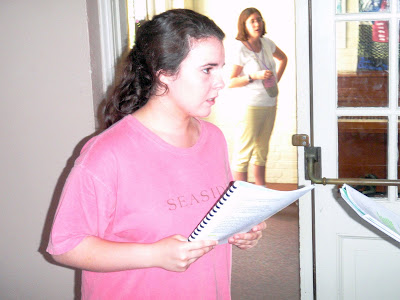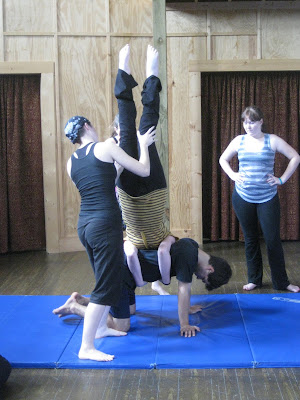 |
| Catherine Gilbert as Diana and Stone Stowers as Neptune |
We’ve
reached week three here at the ASC Theatre Camp. Campers, counselors, directors, and dramaturgs
alike are rearing to go for our big performances on Sunday. By now everyone is
off book, costumes are materializing, and actors are polishing up their
delivery and blocking with the help of their directors and dramaturgs. Of the
three plays that we are performing for session one, John Lyly’s Gallathea stands apart for two reasons:
First, it is the only one of the three written by someone other than William
Shakespeare. Second, it is entirely in prose. These differences should in no
way discourage would-be viewers. As Lilly Carr, one of our campers, said: “Gallathea is ridiculous and funny; complete
with cross-dressing that is Twelfth Night
on steroids.” Lyly’s Gallathea includes witty servants,
supernatural intervention, and problematic love not unlike many Shakespearean
comedic plots. Though the version that will appear on the Blackfriars stage has
been cut down to meet the one-hour time limit, Lyly’s text and the performers
are not short on humorous charm.
 |
| Doing Text Work for a Scene |
Chelsea
Phillips, the director of Gallathea, has created an open, organized, and positive environment
for the campers. Leila Silberstein spoke to this effect when she said: “I
love the freedom that Chelsea gives us. She is always very energetic and
positive.” This sentiment is one that many other performers in Chelsea’s cast
repeated. At the start of each rehearsal, Chelsea typically informs the campers
of what they will be working on and what they can expect during the day. After brief
warm-ups hailed as “spontaneous and fun” by Caroline Link, the campers split up
into their different subplots to work on their scenes. These divisions do not
mean that the campers in one subplot are unaware of the progress and work that
their peers in other groups have made. As Calliope George explained to me: “Rehearsals
are made up of split-up and group work. We get a lot done while also
interacting on a personal level with other members of our cast.” In short, Chelsea
Phillips has given her actors the freedom to work and to develop their characters
while also providing a structured and positive work environment.
 |
| Josie Kritter and Maren Ericsson |
Each cast only has three weeks to
work on their shows, so there isn’t much time to waste. Even so, Gallathea rehearsals are full of
laughter and physical comedy. The characters that Lyly has created are a varied
bunch. While some of our campers only play one role, many get to experience
several roles through doubling (or even tripling). Lily Carr, for example,
plays Robin and the alchemist. In doing so, she faces the challenge presented
by clowning: “Playing a clown is a new experience for me. Everything is a lot
bigger and expressive.” As the campers soon realized, each new role involves
its own set of discoveries and challenges to work with. Since the plot of Gallathea calls for more than just
clowns, there are many types of characters. For example, much of the plot
revolves around the pesky problems posed by the involvement of deities in both
life and love. As such, some of our campers have been faced with playing the parts
of Roman gods. When I asked about her experience playing Diana, goddess of the
hunt and the moon, Catherine Gilbert said, “Diana has been a challenge. She is
very headstrong and stubborn. Not at all like the more lovey characters I’ve
had to play in the past.” Gallathea also
features a set of lovers, played by Campbell Long and Calliope George. Gallathea
and Phillida are similar characters. For this reason, Cam and Calliope
emphasized that their “challenge lies in making our characters their own
people. Our characters have essentially the same backstory and motives. We need
to make it clear to the audience that they are vastly different… oh, and in
love.”
 |
| Stone Stowers as Neptune and Marina Finelli as Venus |
It has been an absolute delight to
observe the rehearsals for Gallathea.
Chelsea’s positive energy combined with the natural humor and creativity of the
campers has yielded a production that is bound to delight. Already a wonderful
show, Gallathea has doubtlessly been
made better by what assistant director and counselor Francis Whitesell called
“the deep abiding love that the cast has for each other.” A great amount of effort, energy and hard
work has gone into making Gallathea, and
I hope that anyone who can will take advantage of the opportunity and come out
to watch it Sunday, July 8th at 2:45 at the Blackfriars Playhouse!
-Madeleine M. Oulevey




















